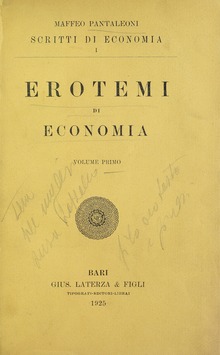Maffeo Pantaleoni
Maffeo Pantaleoni (born July 2, 1857 in Frascati , † October 29, 1924 in Milan ) was one of the most important Italian economists and a respected proponent of neoclassical theory .
He was the son of an Italian senator and an Irish mother. He spent part of his school days in Paris . He finished high school in Potsdam in 1877 . He then attended the University of Rome and graduated in 1882 with his dissertation on the theory of the transfer of taxes.
Teaching
Pantaleoni taught in various institutions:
Pantaleoni started at the Universities of Camerino (1881–1883) and Macerata (1883–1885) and at the University of Commerce in Venice (1885–1888) under Francesco Ferrara . From 1888 to 1892 he was director of the Bari Chamber of Commerce College, but eventually resigned in protest against the government's customs policy.
In 1890 he took over the “Giornale degli Economisti” with Antonio De Viti De Marco . From 1895 to 1897 he taught at the University of Naples and from 1897 to 1900 at the invitation of his friend Pareto at the University of Geneva . In 1901 he received a chair at one of the oldest universities in Europe, the University of Pavia .
Pantaleoni then became a member of the radical party and finally accepted the professorship for economics at the University of Rome from 1901 to 1924.
Other positions
Occasionally, Pantaleoni was referred to by his colleagues as the " Marshall of Italy" due to his unyielding defense of "laissez-faire" economic policies .
Later in his life, before and after World War I , he became a passionate nationalist and an anti-socialist and anti-Semitic politician with close ties to the fascist movement . From 1915 to 1924 he headed the magazine La Vita Italiana with Giovanni Preziosi , who later became General Inspector of the Italian Race Office and was one of the main people responsible for the persecution of Jews in the Italian Social Republic , which in 1921 published the first Italian translation of the forged Protocols of the Elders of Zion .
He was finance minister in the Carnaro government under Gabriele D'Annunzio in the Free State of Fiume , which only lasted 15 months between 1919 and 1920.
Shortly before his death, he was appointed to the Italian Senate by Benito Mussolini .
Fonts
He is one of the founders of general economics . His work “Principii di Economia pura” (Barbera, 1889) introduced, among others, Vilfredo Pareto to the new economy.
Other selected fonts:
- Teoria Della Traslazione dei Tributi , 1882.
- Contributions to the Theory of the Distribution of Public Expenditure , 1883.
- Dall'ammontare probabile della Richezza Privata in Italia , 1884.
- Pure Economics , 1889.
- A proposito di Luigi Cossa e della sua "Histoire des Doctrines économiques" , 1898, GdE
- Dei criteri che devono informare la storia delle dottrine economiche , 1898, GdE
- An attempt to analyze the concepts of "Strong" and "Weak" in their economic connexion , 1898, EJ
- Una visione cinematografica del progresso della scienza economica, 1870-1907 , 1907, GdE
- Note in Margine della Guerra , 1917.
- Politica , 1918.
- Erotemi di Economica , 1925.
swell
- 1997, M. Baldassarri, Sub., Maffeo Pantaleoni. At the Origin of the Italian School of Economics and Finance. London: Macmillan Press and New York: St. Martin's Press
- 1998, Nicolò Bellanca et Nicola Giocoli, Maffeo Pantaleoni, Il principe degli economisti italiani, page 288
- 1998, PD Groenewegen, Maffeo Pantaleoni, In: Meacci, F., ed, Italian economists of the 20th century, Cheltenham, UK - Northampton, USA, pp. 44-68
literature
- Antonio Bianco: PANTALEONI, Maffeo. In: Raffaele Romanelli (ed.): Dizionario Biografico degli Italiani (DBI). Volume 81: Pansini – Pazienza. Istituto della Enciclopedia Italiana, Rome 2014.
- Luca Michelini: Alle origini dell'antisemitismo nazional-fascista: Maffeo Pantaleoni e “La vita italiana” di Giovanni Preziosi, 1915-1924. Marsilio, Venezia 2011, ISBN 978-88-317-0736-7 .
Web links
- Report on Maffeo Pantaleoni (English)
Individual evidence
- ↑ Luca Michelini: Maffeo Pantaleoni: teoria del valore e antisocialismo antisemita. (pdf) In: siecon.org. Retrieved January 30, 2020 (Italian).
| personal data | |
|---|---|
| SURNAME | Pantaleoni, Maffeo |
| ALTERNATIVE NAMES | Pantaleoni |
| BRIEF DESCRIPTION | Italian economist and politician |
| DATE OF BIRTH | July 2, 1857 |
| PLACE OF BIRTH | Frascati |
| DATE OF DEATH | October 29, 1924 |
| Place of death | Milan |


